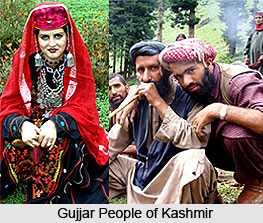 Gujjar community of Kashmir have their own cultural and linguistic heritage. In Rajouri District around 12% population is comprised of Bakarwals (Gujjars) while 23% population belongs to Gurjars, both having some common enlightening as well as linguistic inheritances. Gurjar of Kashmir region mostly rear cattle and they are herdsmen of buffaloes and possess small pieces of lands, kacha houses on slopes and foothills of mountains in Rajouri district. Bakarwals are the offshoots of Gurjars in Kashmir and they are nomadic tribes. Most of them are landless and houseless. Their livelihood is mostly dependent on sheep and goats for which they have to rear these animals. In search of green pastures for their herds and flocks, they travel from one place to another with their baggage and flock of sheep and goats, fleet of horses and dogs. Their favourite dresses are waist Coat, salwar, Kurta (long shirt) and turban while the women usually bear trouser, kurti (shirt) and cotton shawl.
Gujjar community of Kashmir have their own cultural and linguistic heritage. In Rajouri District around 12% population is comprised of Bakarwals (Gujjars) while 23% population belongs to Gurjars, both having some common enlightening as well as linguistic inheritances. Gurjar of Kashmir region mostly rear cattle and they are herdsmen of buffaloes and possess small pieces of lands, kacha houses on slopes and foothills of mountains in Rajouri district. Bakarwals are the offshoots of Gurjars in Kashmir and they are nomadic tribes. Most of them are landless and houseless. Their livelihood is mostly dependent on sheep and goats for which they have to rear these animals. In search of green pastures for their herds and flocks, they travel from one place to another with their baggage and flock of sheep and goats, fleet of horses and dogs. Their favourite dresses are waist Coat, salwar, Kurta (long shirt) and turban while the women usually bear trouser, kurti (shirt) and cotton shawl.
Gujjars or hill people of Kashmir are mostly herdsmen by occupation. They are found in several parts of the state of Jammu and Kashmir. Gujjars of Kashmir are known as Rajputs. They migrated from Rajasthan and accepted the Muslim faith. According to some historians, the Gurjars and Bakarwals originally belong to Rajputana region of Gujara (Kathiawad) and due to famine and other hostile conditions; they migrated to the Kashmir region. Early records show that the Gujjars living on the borders of Kashmir embraced Islam after some time and later on divided into two professionally different sects of Gurjars and Bakarwals. After detailed and in depth study made by the historians, anthropologists, social scientists, researchers and ethnographers the links of Gurjars have been traced to the house of the pandvas of Mahabharata, Lord Krishana himself was closely connected with the family of milkman. Study of India History has revealed that Gurjars played a crucial role in making and unmaking the kingdoms and principalities.
Though the government has done a lot for the development of Gurjars and Bakarwals, like for instance in the matter of education by way of permanent and mobile schools, starting of Gurjar and Bakarwals hostels at the District level with free boarding and lodging facilities, reservation in employment and vocational institutions. However, the Gujjar community in Kashmir is still backward. The Gujjar community of Kashmir have their own Gujri language, which they generally speak. However, they correspond with other persons in Urdu language generally.









